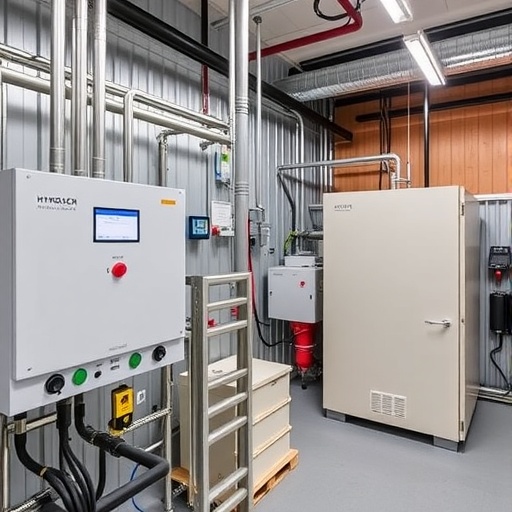Southwest Research Institute (SwRI) has significantly advanced its Metering Research Facility (MRF) in San Antonio with enhancements that allow for critical testing on the compatibility of hydrogen-natural gas blends within current infrastructure. This project addresses an urgent need in energy sectors globally by enabling a detailed analysis of how hydrogen, when blended into existing natural gas pipelines, influences system performance, safety, and durability. Serving as a cutting-edge research test bed, the upgraded facility leverages combined expertise in energy, power, and automotive engineering to explore the practical transition toward cleaner fuels while utilizing established networks and technology.
The initiative comes as hydrogen garners increasing attention as a low-carbon energy carrier, particularly in its potential to reduce greenhouse gas emissions within power generation and domestic fuel usage. MRF Manager Adam Hawley emphasizes that incorporating hydrogen into natural gas grids could offer a cost-effective path toward decarbonization without the prohibitive costs associated with building entirely new energy infrastructure. This hybrid fuel approach promotes sustainability while ensuring continuity in energy delivery through familiar infrastructure components.
Central to the facility’s upgrade is the repurposing of an existing gas loop once dedicated solely to flow measurement and compression studies at low pressures. SwRI’s team re-engineered this system to accommodate the unique properties of hydrogen-natural gas mixtures, enabling the measurement of flow dynamics, pressure variations, and leakage behaviors under controlled conditions. These modifications are crucial for understanding the implications of hydrogen blending on operational safety and metering accuracy for pipeline operators and utility providers.
The MRF now incorporates a state-of-the-art hydrogen injection system designed to introduce precise concentrations of hydrogen into the natural gas stream. This capability is fundamental for replicating real-world scenarios where hydrogen proportions range from mild trace amounts to significant blends of up to 25 percent by volume. With this versatility, the facility can simulate transmission environments, distribution systems, and end-use appliance conditions, offering a comprehensive perspective on fuel blend performance throughout the supply chain.
Safety considerations have been paramount throughout the upgrade process. Recognizing hydrogen’s distinct physical and chemical characteristics—such as its smaller molecular size and higher diffusivity compared to methane—the MRF has integrated advanced leak detection systems capable of identifying hydrogen and natural gas emissions reliably. These innovations are vital to validate existing safety protocols and to develop new guidelines that ensure public and operator safety as hydrogen use scales up.
As part of ongoing research, the facility is conducting endurance testing to evaluate long-term material compatibility and wear implications for pipeline components exposed to hydrogen-enriched gas mixtures. This research helps address concerns related to embrittlement, corrosion, and mechanical integrity, which are critical factors in maintaining system reliability and preventing failures. The findings aim to inform maintenance schedules, material selection, and design standards across the natural gas sector.
Another dimension of SwRI’s MRF capabilities lies in its rigorous flow measurement testing services. Flow measurement for blended gases presents unique challenges due to differing physical properties that influence sensor calibration and accuracy. Through a combination of empirical testing and computational modeling, researchers are optimizing existing technologies and proposing adaptations to ensure precise metering of hydrogen-natural gas mixtures, thus securing accurate billing and regulatory compliance.
Gas composition analysis technologies have also been integrated into the facility, facilitating detailed chemical and physical characterization of the fuel blends. These analyses aid in assessing combustion characteristics, energy content variations, and emissions profiles when hydrogen is introduced. By correlating analytical data with performance testing, the facility supports development pathways for new appliance designs and operational standards that accommodate fuel variability without sacrificing efficiency or safety.
SwRI’s multidisciplinary approach extends to collaborative efforts with industry clients and internal researchers, ensuring that pilot studies and experimental outcomes have practical applicability across a spectrum of sectors. The initial focus on 5 to 25 percent hydrogen blends reflects industry interest in gradual integration scenarios rather than full substitution, allowing stakeholders to adapt technologies incrementally while managing risk and cost.
The expanded scope also incorporates component compatibility assessments that explore how crucial pipeline fittings, valves, meters, and regulators respond to hydrogen-enriched environments. Understanding these interactions is fundamental for system upgrades, as premature component failures could undermine the entire blending strategy. SwRI’s work provides the technical foundation for certifying hardware and establishing performance benchmarks under blended fuel conditions.
Leak detection, a critical safety and environmental concern, is another key research area benefiting from the MRF’s enhancements. Advanced sensor technologies tested at SwRI offer pathways for early detection and mitigation of leaks, which are particularly important given hydrogen’s propensity to diffuse rapidly and its higher flammability. Enhancing leak detection supports regulatory compliance and fortifies public confidence in hydrogen blending initiatives.
Looking forward, the insights generated from SwRI’s upgraded MRF aspire to shape future codes and standards for hydrogen integration within natural gas infrastructure. By demonstrating the technical feasibility and outlining necessary modifications, this research accelerates the broader adoption of hydrogen as a clean, economically viable energy vector. SwRI’s commitment underlines the vital role of research institutions in bridging the gap between emerging technologies and practical deployment at scale.
Overall, Southwest Research Institute’s expansion of its Metering Research Facility marks a pivotal advancement in the global push toward sustainable energy systems. It epitomizes innovative engineering solutions to complex challenges in transitioning legacy infrastructure while fostering meaningful decarbonization. By blending meticulous technical research with forward-thinking applications, SwRI is helping to chart the course for a cleaner, hydrogen-enabled energy future.
For further details on the Metering Research Facility and its capabilities, visit https://www.swri.org/markets/energy-environment/oil-gas/flow-measurement-services/metering-research-facility.
Subject of Research: Hydrogen blending in natural gas infrastructure compatibility and metering technologies.
Article Title: Advancing Hydrogen-Natural Gas Integration: SwRI’s Next-Generation Metering Research Facility
News Publication Date: November 11, 2025
Web References: https://www.swri.org/markets/energy-environment/oil-gas/flow-measurement-services/metering-research-facility
Image Credits: Southwest Research Institute
Keywords
Hydrogen, Mechanical engineering, Energy
Tags: compatibility testing for hydrogen blendsdecarbonization of energy infrastructureenergy infrastructure modernization techniquesenergy sector safety and durabilityhybrid fuel technology developmenthydrogen energy research advancementshydrogen-natural gas blend testinglow-carbon energy carriersmetering research facility enhancementsnatural gas pipeline performance analysisSouthwest Research Institute initiativessustainable energy transition strategies





